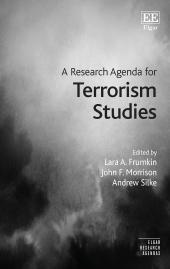A Research Agenda for Terrorism Studies

This new publication co-edited by Dr Lara Frumkin, The Open University, Dr John Morrison, Maynooth University and Professor Andrew Silke, Cranfield University, considers a range of issues faced by those researching terrorism and counter terrorism.
In the aftermath of 9/11, research output on terrorism and counterterrorism increased dramatically. Questions arose as to whether that level of research would be maintained and if the cross-disciplinary nature of the research would continue. Over 20 years on, the answer to both of those questions is a resounding yes.
A research agenda in terrorism studies reviews some of the newer methods in the field (e.g., use of social media and databases) along with more established approaches (e.g., interviews and ethnographies). The book addresses critical terrorism studies and the terrorists themselves as well as newer areas of research, e.g., victims and gender in terrorism studies. Research collaborations are highlighted, particularly joint work between academics and the business sector or law enforcement.
Research in terrorism and counterterrorism has been challenging, emotive and sometimes dangerous. Until the early 2000s, much of this research found itself on the fringes of science. Now, it produces varied outputs from multiple inter- and intra-disciplinary perspectives with attention to methods, cultural and political contexts. This book reflects on where and what the current research is addressing and concludes with predictions about the future directions of terrorism studies.
Upcoming Events
Membership Group Meeting
Thursday, March 5, 2026 - 10:30 to 12:30
Online, Microsoft Teams
Online seminar: Technology-facilitated violence against women and girls: Emerging harms, prevention, and policing implications
Tuesday, March 10, 2026 - 13:00 to 14:30